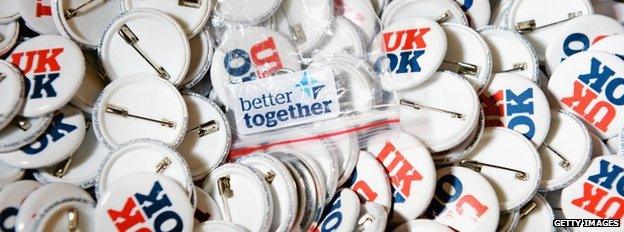Scottish independence: Brown sets out more powers timetable
- Published
Gordon Brown sets out plans to "enhance" powers of the Scottish Parliament
Former prime minister Gordon Brown has set out a timetable for boosting the Scottish Parliament's powers if voters reject independence.
Mr Brown said a "No" vote would be the "starting gun" for Holyrood to be handed greater control over finance, welfare and taxation.
It is understood the three main Westminster parties will formally back Mr Brown's proposals on Tuesday.
The SNP has said the "No" campaign is in a state of "absolute panic".
A Downing Street spokesman said of Mr Brown's announcement: "We welcome this Labour initiative and we are content with the proposed timetable".
On Sunday, Chancellor George Osborne pledged to set out a "plan of action" on the implementation of new powers.
It came in the wake of a YouGov poll which gave the pro-independence campaign a narrow lead for the first time in the campaign ahead of the referendum on 18 September.

In other developments:
The value of the pound on Monday fell by about 1.3% against the US dollar to a ten-month low of $1.61 in the wake of the poll, while shares in some firms with Scottish links also fell.
Prime Minister David Cameron said a number of Nato partners had used last week's summit of the alliance in Wales to raise concerns about the independence referendum
Shadow chancellor Ed Balls has pledged to "oversee a further and big transfer of financial powers from the Treasury to the Scottish government" under any future Labour government
Deputy First Minister Nicola Sturgeon was joined on the campaign trail by actor Alan Cumming as she continued to argue in favour of independence
Nobel Prize winning economist Paul Krugman has written an article on Scottish independence for the New York Times, external in which he warns that the "risks of going it alone are huge". He also claims: "You may think that Scotland can become another Canada, but it's all too likely that it would end up becoming Spain without the sunshine."
Buckingham Palace has insisted the Queen remains neutral, despite a number of newspapers reporting her apparent concern about the potential break up of the United Kingdom

Mr Brown formally unveiled his proposed timetable for those new powers, in a speech at the Loanhead Miners Welfare and Social Club in Midlothian on Monday evening:
work to begin on the new legislation on 19 September, the day after the referendum.
a "command paper" to be published by the present UK government setting out all the proposals by end of October.
a white paper to be drawn up by the end of November after a period of consultation setting out the proposed powers
a draft new law to be published for a new Scotland Act in January.

Analysis: Norman Smith, BBC assistant political editor
Despite the apparent momentum building behind the Yes campaign, Downing Street insists there will be no change of strategy, no surge of announcements, no rush of ministerial visits.
Instead, the UK government intends to stick doggedly to its core strategy of warning about the economic dangers of separation and doubts about a future Scottish currency. No 10 hopes this, coupled with the promise of more powers for Scotland, will be enough to save the Union.
But among MPs on all sides, there is mounting anxiety. One senior Tory told me it was "typical last-minute panic from Cameron and Osborne".
Anxiety centres on what is seen as a lack of passion and a call for Mr Cameron to inject more emotion into the case for the union, to talk less about sterling and more about family and values.
There are also demands for the prime minister to show more urgency, to sweep aside the rest of his diary and to focus solely on Scotland.
As for Ed Miliband, there are similar worries that he has failed to shore up the Labour vote and made little impact in its Scottish heartlands.
In short, leaders may not be panicking just yet but there are plenty of their MPs who are already deeply fearful that the break-up of the union may be just 10 days away.

Mr Brown went on to restate what new powers Labour would be pushing for, in 12 policy areas. They included the option of a non-profit making railway company and devolving powers over the work programme and housing benefit.
He said: "There never again could be a bedroom tax imposed by Westminster on Scotland because we would give the power to set housing benefit to the Labour people and everyone else who is in the Scottish parliament.
"These are big changes that we are proposing. To strengthen the Scottish Parliament but at the same to stay as part of the United Kingdom for pensions, for social security for funding out health service, for the currency, interest rates, the economy, defence and security."
A Downing Street source earlier said Mr Brown's timetable was "not a million miles away from our thinking" while another added: "This is in line with the fruits of the cross-party discussions."

Analysis: Kamal Ahmed, BBC business editor
The poll by YouGov in The Sunday Times at the weekend has led to an "intensifying debate on how to react", according to a very senior business figure close to this debate I spoke to this morning.
Two banking sources have also revealed that bank branches north of the border have started holding more cash at branches, in case members of the public decide they want to take out their money.
That is how seriously the banks themselves, and the Bank of England (which has been informed about this cash move), are taking the possibility of a Yes vote on 18 September.
Let's be clear. There appears to be no evidence yet of "deposit flight" - people moving money to English domiciled banks. And sources have said that moving some additional cash to branches is often a reaction to electorally volatile situations - a close general election, for example.
But financial institutions are preparing for all eventualities with movements of cash (a very small percentage of the liquidity they hold) and short-term buffer arrangements, should the need arise.

Speaking ahead of Mr Brown's announcement, Alistair Darling, the head of the pro-UK Better Together campaign, stressed that no new powers would be put on the table beyond those already announced by the three main Westminster parties earlier this year.
He added: "The additional powers coming to the Scottish Parliament were announced by the party leaders, north and south of the border, some time ago.
"People have said, 'Yes we want to know the timetable and the process' and that is something the government is going to announce this week.
Scottish Finance Secretary John Swinney says there is an "atmosphere of absolute panic in the no campaign"
"But remember this, this is a referendum on whether or not we stay on the United Kingdom. It is not a referendum on what further powers we are going to get. We are going to get them anyway, if we stay in the United Kingdom.
Scottish First Minister Alex Salmond said plans to increase the powers of the devolved Edinburgh parliament were a "panicky measure" announced without credibility, because the Yes Scotland campaign for independence was "winning on the ground".
Speaking on behalf of Yes Scotland, former Scottish Labour Party chairman and Labour for Independence campaigner Bob Thomson said: "This smacks of utter panic and desperation by the 'No' campaign as they lose their lead in the polls.
"Gordon Brown is in no position to offer anything - he is a backbench MP, and the Tories are in power at Westminster.
"The choice is to vote Yes for all the powers we need to create jobs and protect Scotland's NHS - or No for a Tory-led talking shop.
"The people of Scotland will not trust the Tories to deliver powers that in any event fall far short of what we need. The sure fire way to achieve the full range of powers Scotland needs to build a fairer society and more prosperous economy is to vote Yes a week on Thursday."


Scottish Labour - Its devolution commission, external has backed increased tax-varying powers and control over some elements of welfare and benefits policy. It said MSPs should be able to vary tax by up to 15p, giving them the option of restoring the 50p rate for top earners - but there would be no power to cut the upper income tax rate, which currently sits at 45p.
Scottish Conservative - Scottish Conservative leader Ruth Davidson has said Scotland should be given full income tax powers, a key recommendation of the party's devolution commission, external, chaired by Lord Strathclyde. The commission, which said the income tax plan would see the Scottish Parliament accountable for 40% of the money it spent, also said there was a case for a share of Scottish VAT receipts being assigned to Holyrood.
Scottish Liberal Democrats - Its commission, chaired by former UK party leader Sir Menzies Campbell, external, proposes a federal structure for the UK. It would give the Scottish Parliament control over financial powers including inheritance tax, capital gains tax, income tax and a good share of corporation tax. It also called for the devolution of new borrowing powers; new Partnership Powers to require Holyrood and Westminster to work together; a role for the Supreme Court in resolving disputes; and a new needs based formula to eventually replace the Barnett Formula.

What are the issues of the referendum?

As the people of Scotland weigh up how to vote in the independence referendum, they are asking questions on a range of topics.
But what issues are important? Explore our special Scotland Decides website, where you find more on the economy; energy; pensions; citizenship; relations with the rest of the UK; EU membership; defence and broadcasting.

Labour leader Ed Miliband is to welcome Gordon Brown's proposals in a speech at a TUC dinner later.
Arriving at the event in Liverpool, he said many trade unions were campaigning for a No vote for "solidarity and social justice".
He insisted Labour would deliver the timetable outlined by Mr Brown if elected to government in May 2015.
"Voting No in this referendum is not a vote for no change, we will deliver change, we are determined to deliver change," Mr Miliband added.
"Change for greater social justice for Scotland but also change for greater devolution to Scotland. We know things need to change and a No vote will deliver that change."


A referendum on whether Scotland should become independent is to take place
People resident in Scotland will be able to take part in the vote, answering the "yes/no" question: "Should Scotland be an independent country?"
The referendum will take place on Thursday, 18 September 2014
Go to the BBC's Scotland Decides page for analysis, background and explainers on the independence debate
Keep across the latest polls with our interactive guide.